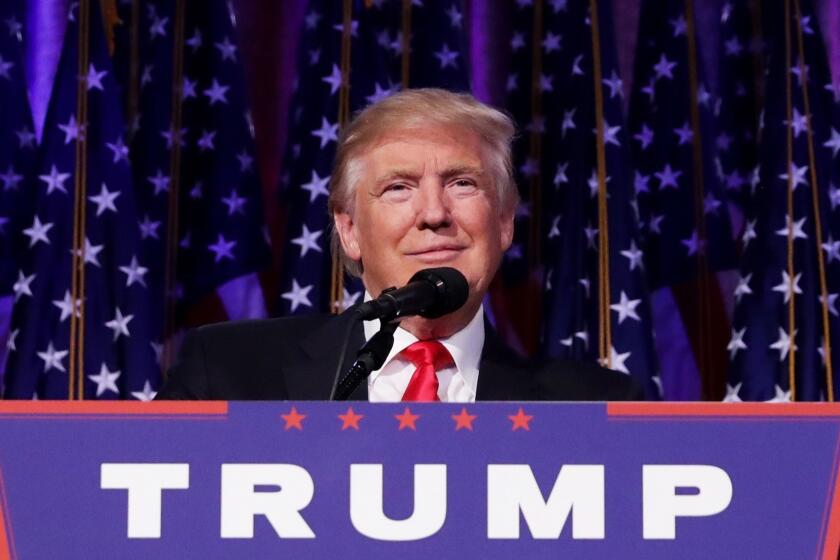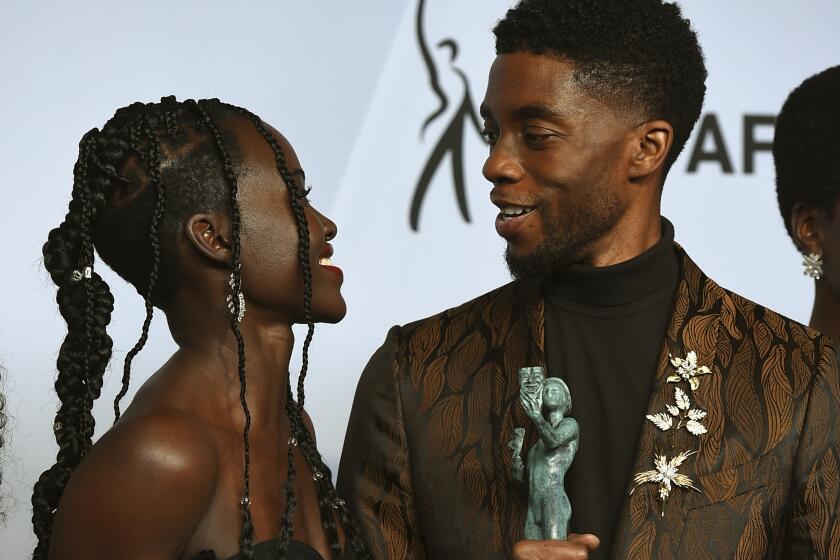Review: In ‘American Dharma,’ Steve Bannon gleefully reflects on the election of President Trump
“American Dharma” is the gospel according to Stephen K. Bannon — a feature-length conversation with the Trump White House’s former chief political advisor that is both more interesting and more depressing than you might be expecting.
Structured as a dialogue with director Errol Morris, “Dharma” was criticized when it premiered at the Venice International Film Festival more than a year ago as giving too uncritical a platform to Bannon, whose appeals to naked nationalism led to his forced exit from the Trump administration after 2017’s fatal Unite the Right rally in Charlottesville, Va.
But Morris has never been the relentless Mike Wallace of directors, preferring instead, in films like “The Fog of War” (with Robert McNamara) and “The Unknown Known” (with Donald Rumsfeld), to be a leisurely interlocutor, giving subjects the proverbial rope needed for self-destruction.
Bannon, as glib and charismatic as they come, takes full advantage of this, not neglecting to butter up the director by emphasizing how blown away he was by “Fog of War.” And, in truth, political differences aside, both men seem to be inordinately pleased by the opportunity to talk to each other.
Sunday afternoon at the Toronto International Film Festival saw the North American premiere of Errol Morris’ documentary “American Dharma” — which is essentially an extended interview with controversial political advisor Steve Bannon.
A considerable amount of the talk, surprising even given the fact that Bannon worked for years in Hollywood, has to do with the movies, specifically a handful of Bannon’s favorites which he is only too happy to wax enthusiastically about to Morris.
Say what you will about the man, he does have classic taste, with films like John Ford westerns “The Searchers” and “The Man Who Shot Liberty Valance” sharing screen time with Stanley Kubrick’s anti-war drama “Paths of Glory” as well as Bannon’s favorite film, the Gregory Peck-starring 1949 “Twelve O’Clock High.”
Peck plays a World War II Air Force general who has to be tough in order to make his men as good as they can be. It’s not that he wants to be that way, Bannon says, “he understands that it’s his dharma,” a Buddhist term that he defines as “duty, fate, destiny.”
Bannon sees both himself and Trump in those terms, as men who had to do what had to be done if the “fairly radical restructuring of the permanent political class” he felt was necessary to rescue the country from nebulous “elites” was to happen.
“This can’t be a pillow fight,” Bannon says dramatically before characterizing Trump as “a blunt force instrument” and “an armor-piercing shell,” terms he intends as the highest of praise.
Wherever Steve Bannon appears, controversy follows.
Perhaps the most fascinating film discussion relates to Orson Welles’ “Chimes at Midnight,” where King Henry V turns his back on his old friend and mentor Sir John Falstaff just the way President Trump turned his back on Bannon, a man who had helped make him president.
Except that Bannon does not see Falstaff as a man scorned, not in the slightest. “It was not betrayal, it was the natural order of things,” he insists. “It had to happen.”
Though this film analysis has its interest, the most involving parts of “American Dharma” are not Bannon expounding on his political philosophy but his postmortem on the nuts and bolts of the successful campaign he helped run against Hillary Clinton.
Bannon cut his teeth working for the Breitbart News website, and he can barely contain his glee at how Breitbart made the most of the Anthony Weiner affair after having the congressman’s Twitter feed under 24-7 observation.
Then there is Bannon’s version of how he turned the Trump campaign around after coming onboard when the candidate was “double digits down in the polls.”
When Donald Trump was elected president in 2016, his victory stunned millions.
It was his idea, the man says, to position Trump as “the agent of change against a corrupt system.” When Clinton attacked the nationalistic Bannon-Breitbart universe, Bannon says “she walked into a trap.
“If she was going to preach identity politics and we are going to preach bringing jobs back, I knew we had her.”
Also instructive is Bannon’s claim that he counteracted the “Access Hollywood” tape scandal by showing up at the next presidential debate with women who accused Bill Clinton of rape, a move he delightedly describes as “jiujitsu.”
Completely self-congratulatory though this material is, it also gives a disheartening picture of manipulation and gullibility. If, as H.L. Mencken claimed, nobody ever lost money underestimating the intelligence of the American public, that apparently continues to be true where political matters are concerned.
'American Dharma'
Not rated
Running time: 1 hour, 38 minutes
Playing: Laemmle Playhouse 7, Pasadena, Alamo Drafthouse, DTLA
More to Read
Only good movies
Get the Indie Focus newsletter, Mark Olsen's weekly guide to the world of cinema.
You may occasionally receive promotional content from the Los Angeles Times.












